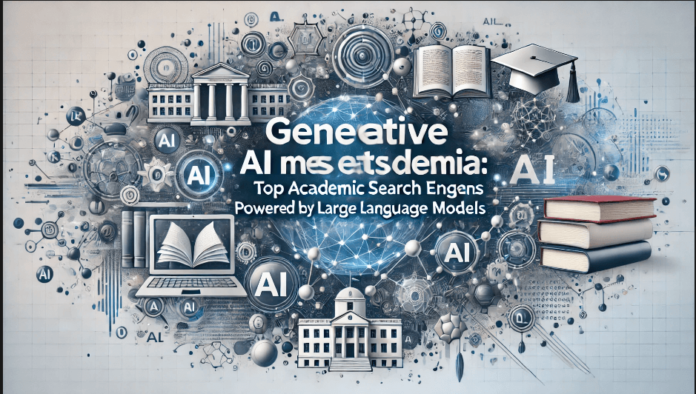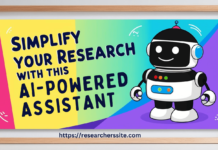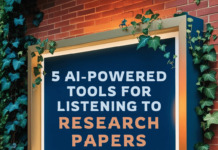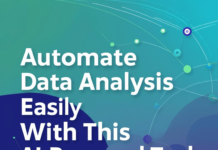As academic research continues to evolve, the integration of Artificial Intelligence (AI) into academic search engines is revolutionizing how researchers find, analyze, and utilize information. Generative AI, in particular, leverages large language models to provide more intuitive, efficient, and comprehensive search capabilities. This blog post explores some of the top academic search engines powered by large language models, detailing their features and benefits.
What is Generative AI?
Generative AI refers to systems that use machine learning models to generate new data, ideas, or patterns based on the input they receive. In the context of academic research, generative AI enhances search engines by adding more accurate, context-aware, and insightful results. These advanced tools help researchers streamline their work, uncover new connections, and access relevant literature with greater ease.
Top Academic Search Engines Powered by Large Language Models
No #1. Assistant by Scite
Assistant by Scite leverages AI to enhance the academic research process by providing smart citation contexts. It helps you understand how a academic paper has been cited by showing whether the citations support or contradict the study.
This context-aware approach aids in quickly assessing the reliability and impact of studies. Additionally, it provides features like summarization of research papers and suggests relevant studies, enhances research efficiency. The tool integrates seamlessly with other research platforms and that make it a valuable addition to any researcher’s toolkit.
No #2. SciSpace
SciSpace is designed to help researchers navigate scientific literature efficiently. It employs AI to offer robust search capabilities, providing context-aware recommendations and summarizing key findings.
You can organize and manage your papers within the platform, which also supports collaborative work. SciSpace’s integration with other academic tools enhances its utility, and make it a comprehensive solution for academic research.
Its AI-driven insights help researchers stay updated with the latest developments in their fields.
In my previous post, “AI-powered Citation Generator Tool for Academic Research,” I offered a comprehensive discussion and a step-by-step guide on using SciSpace.
No #3. Scopus AI
Scopus AI enhances the traditional Scopus database with advanced AI features. It provides refined search results through topic clustering and citation analysis.
It helps monitor research trends and track the impact of specific studies. Besides, Scopus AI offers personalized recommendations and let you find reliable relevant literature in their field. Its extensive database includes millions of records which ensures comprehensive coverage of academic research.
No #4. Scholar AI
Scholar AI uses machine learning to improve academic search and discovery. It provides comprehensive literature reviews by summarizing key findings from multiple sources. The tool offers advanced search capabilities, including semantic search, which understands the context of queries.
Scholar AI also helps researchers track citations and identify influential papers. Its intuitive interface makes it easy to navigate and utilize its powerful features.
No #5. Dimensions Assistant AI
Dimensions Assistant AI is a dynamic academic search engine that covers a wide range of scholarly content, including publications, grants, and patents. It uses AI to provide predictive analytics and personalized research recommendations.
Its advanced search features help you find the most relevant studies quickly. Dimensions Assistant AI also offers tools for analyzing the impact and connections within the academic landscape. Its comprehensive metrics support research evaluation and planning.
No #6. Ask R Discovery
“Ask R Discovery” is an AI-powered tool designed for researchers and science enthusiasts, providing verified answers validated by full-text scientific articles to enhance credibility and knowledge. It offers simplified search options with one-click access to authentic answers, citations, and links to referenced research papers.
Users benefit from a vast knowledge base of over 250 million scholarly articles across major subject areas, allowing for instant insights. This tool saves time and effort, supporting research and writing tasks efficiently by leveraging data from scientific literature.
“Ask R Discovery” goes beyond a typical scientific search engine by providing summarized answers to top research queries, delivering the most relevant results quickly and comprehensibly.
It enhances understanding and keeps users updated on a wide range of research topics. Powered by generative AI, the tool is designed to overcome the usual challenges associated with generic AI tools, ensuring accurate and reliable information.
No #7. Consensus
Consensus is designed to help researchers quickly gather and summarize scientific consensus on specific topics. It uses natural language processing to extract key points from multiple research papers.
This tool supports evidence-based decision-making by providing clear and concise summaries of scientific findings. Consensus also offers tools for tracking citations and analyzing the influence of research. Its AI-driven insights enhance the efficiency of literature reviews and knowledge synthesis.
No #8. Elicit
Elicit is an AI research assistant that aids in literature review by identifying relevant studies and summarizing their findings. It uses natural language processing to answer specific research questions by pulling data from a vast array of academic papers.
Elicit helps streamline the research process, making it more efficient and targeted. The tool’s advanced search capabilities ensure that researchers can find and utilize the most relevant literature. Elicit’s intuitive design supports easy integration into existing research workflows.
Conclusion
Generative AI is transforming academic research by enhancing the capabilities of search engines with large language models. Tools like Assistant by Scite, SciSpace, Scopus AI, Scholar AI, Dimensions Assistant AI, R Discovery, Consensus, and Elicit are at the forefront of this revolution.
These platforms provide researchers with powerful tools to navigate the vast landscape of academic literature, making research more efficient, accurate, and insightful.
FAQs
What is Generative AI in academic research?
Generative AI in academic research refers to the use of machine learning models to generate new data, ideas, or patterns based on input, enhancing search engines with more accurate and context-aware results.
How do AI-powered academic search engines benefit researchers?
AI-powered academic search engines benefit researchers by providing advanced search capabilities, personalized recommendations, and comprehensive insights, making literature reviews and research more efficient.
Can AI tools help with citation tracking?
Yes, AI tools like Assistant by Scite offer advanced citation tracking features, helping researchers understand the impact and context of citations within academic literature.
Are these AI tools easy to integrate into existing research workflows?
Many AI tools, such as SciSpace and Elicit, are designed to integrate seamlessly with existing research workflows, offering user-friendly interfaces and compatibility with other academic tools.
For more information, you can explore the official websites and user guides of these AI-powered academic search engines.














